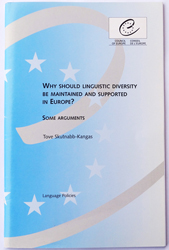|
Welcome to the website
of the movement for
Linguistic Human Rights
in the World
A place for
information, discussion
and action concerning
Linguistic Human Rights:
www.linguistic-rights.org
Lingvaj Rajtoj
Derechos Lingüísticos
الحقوق اللغوية
Droits Linguistiques
ЯЗЫКОВЫЕ ПРАВА
Linguistic Rights
语言权
언어권리
Sprachliche Rechte
|

|
International language policy conference:
"Perspectives of language communication in the EU"
Nitra, Slovakia, 28-29 July 2016
Remarks by European Commissioner, Vytenis Andriukaitis
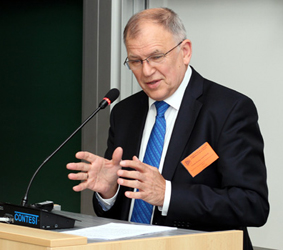
Vytenis Povilas Andriukaitis in Nitra, Slovakia
28th July 2016
(Photo: Jozef Baláž)
|
Original: esperanto
I am delighted to be here in Nitra for this important conference, which deals with language communication in the EU, and I thank the organisers for their hard work over the past year.
The three themes of the conference are particularly topical in today's Europe. They are citizen engagement and multilingualism; economic integration and multilingualism, and educational inclusion through improved language learning. European integration has sometimes been criticised as being too distant from the citizen, of integrating economies rather than citizens, of failing to appeal to the citizen at the deeper, emotional level. Much of the growth of euro-sceptical political movements in recent years can be traced to strong national identities facing a European identity which is weak or non-existent.
Citizens see EU multilingualism policy as weak, as in practical life they are often forced to use one or two dominant language in their contacts with EU institutions. This leads to increasing alienation from the EU of citizens whose languages are not widely used by EU institutions.
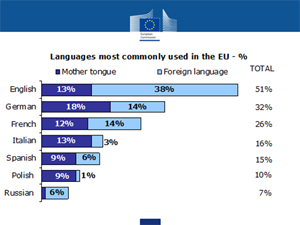 Such disparities should not exist as multilingualism is a core EU value - it is in the very heart of the motto of the European Union: United in Diversity. The four freedoms which were at the centre of the European project from the outset - the free movement of goods, people, services and capitals - all imply an exchange between speakers of different languages, either direct or mediated by professional translators and interpreters. We might all be different, but we are all equal. Every country has his one culture identity, different cultural minorities and quite often not only official language, but also a bunch of different foreign languages incorporated within. And this colourful bunch makes us different but still equal talking about our rights and opportunities.
Such disparities should not exist as multilingualism is a core EU value - it is in the very heart of the motto of the European Union: United in Diversity. The four freedoms which were at the centre of the European project from the outset - the free movement of goods, people, services and capitals - all imply an exchange between speakers of different languages, either direct or mediated by professional translators and interpreters. We might all be different, but we are all equal. Every country has his one culture identity, different cultural minorities and quite often not only official language, but also a bunch of different foreign languages incorporated within. And this colourful bunch makes us different but still equal talking about our rights and opportunities.
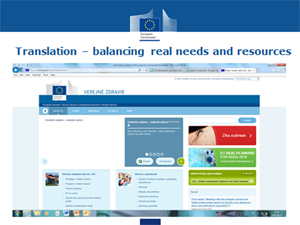 Indeed, it is essential to ensure non-discrimination in the treatment of EU citizens, and to ensure that all languages spoken within the EU, whether large or small, and whether they are national, regional or minority languages, are cherished and protected equally.
Indeed, it is essential to ensure non-discrimination in the treatment of EU citizens, and to ensure that all languages spoken within the EU, whether large or small, and whether they are national, regional or minority languages, are cherished and protected equally.
All languages are a central element of the identity of their speakers. Some 18% of the entire European Union population have German as their mother tongue; less than 1% speak Lithuanian, my mother tongue. But this does not make any difference to me. Lithuanian is the language and the mind-set that I grew up in; it is the first pair of lenses through which I learnt to look at the world.
Let me remind you that the European Union is the nice project of peace. In 2012 the EU received the Nobel Peace Prize for advancing the causes of peace, reconciliation, democracy and human rights in Europe.
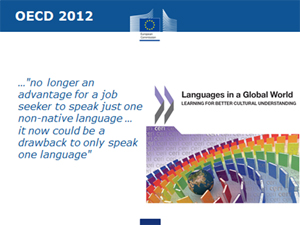 The multilingualism in the EU could and should be one of the examples seeking to live in peace and diversity. There are different countries which have two or three official languages, like Belgium, Finland or Ireland, of course, sometimes they are dealing with different issues in this field, but still remain an evident expression of democracy.
Therefore, in the European Parliament and in the European Council all 23 EU languages are fully used. In the European Commission we have three official working languages, though lots of documents are also translated in all EU languages.
The multilingualism in the EU could and should be one of the examples seeking to live in peace and diversity. There are different countries which have two or three official languages, like Belgium, Finland or Ireland, of course, sometimes they are dealing with different issues in this field, but still remain an evident expression of democracy.
Therefore, in the European Parliament and in the European Council all 23 EU languages are fully used. In the European Commission we have three official working languages, though lots of documents are also translated in all EU languages.
To preserve the EU's linguistic diversity, in the European institutions we rely heavily on translation. It is of course not possible to translate every document and every news item published by the European Commission into 23 languages. However, most of the information which is of prime interest for the general public, such as the Public Health portal managed by my own services, is available in all or most official languages.
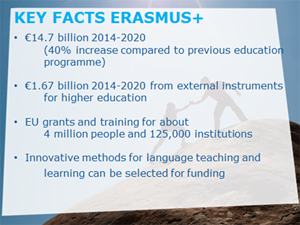 But even with the ever-increasing opportunities to provide information that is easy to understand for everyone, we must also keep in mind that the mastery of other languages provides a considerable advantage in a competitive environment. It is therefore important that several languages are taught in school. Pupils also need to acquire metalinguistic competences and an open attitude to languages, which will make it possible for them to continue developing their language capital in a lifelong perspective.
But even with the ever-increasing opportunities to provide information that is easy to understand for everyone, we must also keep in mind that the mastery of other languages provides a considerable advantage in a competitive environment. It is therefore important that several languages are taught in school. Pupils also need to acquire metalinguistic competences and an open attitude to languages, which will make it possible for them to continue developing their language capital in a lifelong perspective.
The European Union is therefore funding support to language teaching, while also recognizing the importance of linguistic diversity, promoting the teaching of both larger and smaller languages. Members States are assisted through peer learning activities facilitating an exchange of good practices, reports such as the one you see on this slide and funding through Erasmus+ and several other instruments.
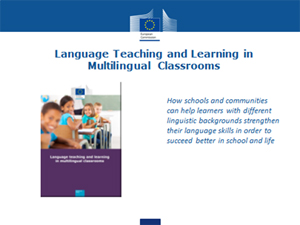 Cooperation activities amongst Member States in the field of language teaching and learning are also greatly welcomed by the European Commission. The ability to be able to communicate in several languages is part of the Key Competence Framework for Lifelong Learning, which the Commission will review and reinforce as part of the Skills Agenda which was adopted just over a month ago.
Cooperation activities amongst Member States in the field of language teaching and learning are also greatly welcomed by the European Commission. The ability to be able to communicate in several languages is part of the Key Competence Framework for Lifelong Learning, which the Commission will review and reinforce as part of the Skills Agenda which was adopted just over a month ago.
All these mentioned measures are essential as they can not only address the needs of Europeans deriving from changing societies, but also contribute towards stronger and closer integration. For instance, the Multilingualism, Inclusion and Mobility in Europe (MIME project), 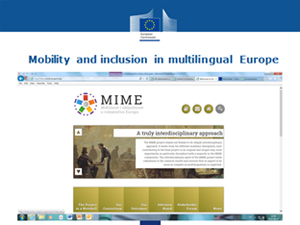 coordinated by the University of Geneva and Prof François Grin, is providing scientific support to show that inclusion and mobility are fully compatible with today's multilingual Europe. We must, therefore, continue to push for best possible practises of language education around the EU. coordinated by the University of Geneva and Prof François Grin, is providing scientific support to show that inclusion and mobility are fully compatible with today's multilingual Europe. We must, therefore, continue to push for best possible practises of language education around the EU.
We must also consider all the tools available for us to achieve these goals. Therefore, please allow me to continue my speech with sharing my personal views on another measure that is often forgotten, but might be just as equally important - Esperanto.
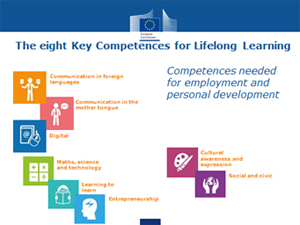 Personally for me Esperanto has a clear connotation with the fight against coercion. In the soviet times the use of Esperanto was a protest against dominating Russian language which we were forced to use. In the dissident movement I proposed to speak Esperanto instead - as the symbol of humanism and democracy.
Personally for me Esperanto has a clear connotation with the fight against coercion. In the soviet times the use of Esperanto was a protest against dominating Russian language which we were forced to use. In the dissident movement I proposed to speak Esperanto instead - as the symbol of humanism and democracy.
So as a young man I learned this language, as I was inspired by its internal idea, the ideal of a world at peace. The motivating ideal of Dr Ludwig Zamenhof, who initiated Esperanto, is often misunderstood: Peace, based on equal rights and justice. Esperanto is merely a tool, though a vitally important tool, to help reach this ideal. This ideal dovetails neatly with the aim of the European Union, which has been described at the world's most successful peace project. It has brought the 28 EU countries their longest ever period of peace.
As Umberto Eco once wrote, the life of Zamenhof can be an inspiration to us. He spoke many languages fluently, and was thus a good example of multilingualism in practice, a multilingualism to which the EU aspires. Yet his whole life was dominated by a passion to defend the equal human dignity of every human being, by preventing the strong from imposing their languages on others. He understood that this mutual recognition of the equal human rights of all citizens is essential for a lasting peace and panhumanism.
An interesting book by Dr Ulrich Lins, Die Gefährliche Sprache, describes the attempts by the regimes of Hitler and Stalin to kill off Esperanto. Hitler hated this "artificial languages invented by a Jew", and mentions it in "Mein Kampf". Stalin understood that the direct international communication made possible by Esperanto could quickly undermine his own propaganda. Both regimes had many Esperanto speakers murdered, and it can be said that a language for which people have died can no longer be called "artificial".
I would like to correct some misunderstandings regarding Esperanto. One sometimes hears people say: "Esperanto has no culture." Those who think thus are so wedded to the idea of a national culture, a nationalistic concept, that they are unable to imagine a language whose culture would be shared by the whole human race. Yet Esperanto has everything possessed by the most developed national languages - poetry, songs, drama, fiction and non-fiction, first class translations of the world's finest literature, by native speakers of the languages concerned. Esperanto in its almost 130 years of existence has created its own rich culture, contributed to by its users from over 120 nations, and has become a part of the world heritage.
Esperanto is in many ways the ally of the smaller languages. It enables communication on a planetary scale, yet its streamlined grammar and vocabulary enables one to master it very quickly, in about one-tenth the time it takes to master any national language. In addition, the propaedeutical qualities of Esperanto, which have been tested in practice many times, accelerate and improve the subsequent study of other languages. Its vocabulary is mainly Indo-European, and its syntax has much in common with languages as diverse as Finnish, Hungarian, Turkish and Mandarin Chinese. It is thus an ideal launching pad for the study of other languages. This phenomenon will be discussed in greater detail by our conference.
English is very useful and widespread in today's world. Its study is to be encouraged. However, it can never produce the equality in communication of Esperanto - where all make the effort to learn an easy, neutral language. Through Esperanto one can avoid the imperialism and hegemony of one national language, which gives lifelong, unearned privileges to its native speakers, and unfairly puts the majority of mankind at a permanent disadvantage. Not even the most vehement advocates of Esperanto wish to see it replace other languages. Zamenhof wrote poetry in his native Yiddish, and in Russian, his language of study. He translated all of the Old Testament from Hebrew to Esperanto. As a poet, Zamenhof was fully conscious of the irreplaceable value of all human languages. Through Esperanto, the literary gems of my own Lithuanian, and other smaller languages such as Hungarian, Croatian and Slovak, have found their way into Chinese and Japanese, and are thus contributing to the international understanding which is vital for peace.
Within the EU, a role for Esperanto could help strengthen a common European identity, and thus make the EU more effective in its role of working for peace in Europe and throughout the world. The EU and Esperanto share a commitment to peace, to fairness and to non-discrimination. Improved language communication has much to learn from the general progress of European integration, based on the ideas of Robert Schuman as first expressed on 9 May 1950: "Europe will not be made all at once, or according to a single plan. It will be built through concrete achievements which first create a de facto solidarity."
Similarly Esperanto will not progress all at once, but through the voluntary decisions of a number of Member States to give it a place in their curricula, initially as an aid to language learning in general. The Visegrad 4 countries are ideally placed to take this step, in the framework of their already well-developed cooperation in other areas. I hope that the Nitra conference, building on the Bratislava conference of 2006, will play an important role in strengthening multilingualism, and in ensuring the practical use of all of our languages. Let us never lose sight of the common objective of both Esperanto and the European Union - PEACE.
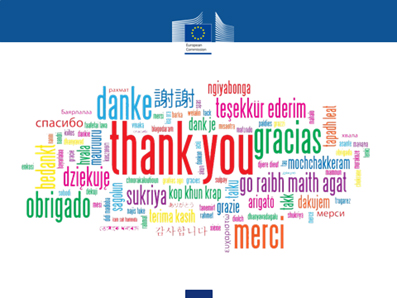
The original version of the speech, in Esperanto, is on the website of the European Commission:
Speech| 28 July 2016 - International language policy conference: "Perspectives of language communication in the EU", Nitra, Slovakia – 28 July 2016

|
↑ ↑ ↑
↑ ↑ ↑
|
العربية | Беларуская | Dansk | Deutsch | English | Español | Esperanto | Français | Gaeilge
Bahasa Indonesia | Íslenska | 한국어 | Italiano | Magyar | Nederlands | Português | по-русски
Slovenčina | Српски | తెలుగు | Українська | 语言权
© 2008-2017 Agado por Lingvaj Rajtoj, UEA
Reguloj pri utiligo | Privateco | Leĝe | Kontakto
traduko | informado | retejmapo

|




 Such disparities should not exist as multilingualism is a core EU value - it is in the very heart of the motto of the European Union: United in Diversity. The four freedoms which were at the centre of the European project from the outset - the free movement of goods, people, services and capitals - all imply an exchange between speakers of different languages, either direct or mediated by professional translators and interpreters. We might all be different, but we are all equal. Every country has his one culture identity, different cultural minorities and quite often not only official language, but also a bunch of different foreign languages incorporated within. And this colourful bunch makes us different but still equal talking about our rights and opportunities.
Such disparities should not exist as multilingualism is a core EU value - it is in the very heart of the motto of the European Union: United in Diversity. The four freedoms which were at the centre of the European project from the outset - the free movement of goods, people, services and capitals - all imply an exchange between speakers of different languages, either direct or mediated by professional translators and interpreters. We might all be different, but we are all equal. Every country has his one culture identity, different cultural minorities and quite often not only official language, but also a bunch of different foreign languages incorporated within. And this colourful bunch makes us different but still equal talking about our rights and opportunities.
 Indeed, it is essential to ensure non-discrimination in the treatment of EU citizens, and to ensure that all languages spoken within the EU, whether large or small, and whether they are national, regional or minority languages, are cherished and protected equally.
Indeed, it is essential to ensure non-discrimination in the treatment of EU citizens, and to ensure that all languages spoken within the EU, whether large or small, and whether they are national, regional or minority languages, are cherished and protected equally.
 The multilingualism in the EU could and should be one of the examples seeking to live in peace and diversity. There are different countries which have two or three official languages, like Belgium, Finland or Ireland, of course, sometimes they are dealing with different issues in this field, but still remain an evident expression of democracy.
Therefore, in the European Parliament and in the European Council all 23 EU languages are fully used. In the European Commission we have three official working languages, though lots of documents are also translated in all EU languages.
The multilingualism in the EU could and should be one of the examples seeking to live in peace and diversity. There are different countries which have two or three official languages, like Belgium, Finland or Ireland, of course, sometimes they are dealing with different issues in this field, but still remain an evident expression of democracy.
Therefore, in the European Parliament and in the European Council all 23 EU languages are fully used. In the European Commission we have three official working languages, though lots of documents are also translated in all EU languages.
 But even with the ever-increasing opportunities to provide information that is easy to understand for everyone, we must also keep in mind that the mastery of other languages provides a considerable advantage in a competitive environment. It is therefore important that several languages are taught in school. Pupils also need to acquire metalinguistic competences and an open attitude to languages, which will make it possible for them to continue developing their language capital in a lifelong perspective.
But even with the ever-increasing opportunities to provide information that is easy to understand for everyone, we must also keep in mind that the mastery of other languages provides a considerable advantage in a competitive environment. It is therefore important that several languages are taught in school. Pupils also need to acquire metalinguistic competences and an open attitude to languages, which will make it possible for them to continue developing their language capital in a lifelong perspective.
 Cooperation activities amongst Member States in the field of language teaching and learning are also greatly welcomed by the European Commission. The ability to be able to communicate in several languages is part of the Key Competence Framework for Lifelong Learning, which the Commission will review and reinforce as part of the Skills Agenda which was adopted just over a month ago.
Cooperation activities amongst Member States in the field of language teaching and learning are also greatly welcomed by the European Commission. The ability to be able to communicate in several languages is part of the Key Competence Framework for Lifelong Learning, which the Commission will review and reinforce as part of the Skills Agenda which was adopted just over a month ago.
 coordinated by the University of Geneva and Prof François Grin, is providing scientific support to show that inclusion and mobility are fully compatible with today's multilingual Europe. We must, therefore, continue to push for best possible practises of language education around the EU.
coordinated by the University of Geneva and Prof François Grin, is providing scientific support to show that inclusion and mobility are fully compatible with today's multilingual Europe. We must, therefore, continue to push for best possible practises of language education around the EU.
 Personally for me Esperanto has a clear connotation with the fight against coercion. In the soviet times the use of Esperanto was a protest against dominating Russian language which we were forced to use. In the dissident movement I proposed to speak Esperanto instead - as the symbol of humanism and democracy.
Personally for me Esperanto has a clear connotation with the fight against coercion. In the soviet times the use of Esperanto was a protest against dominating Russian language which we were forced to use. In the dissident movement I proposed to speak Esperanto instead - as the symbol of humanism and democracy.
